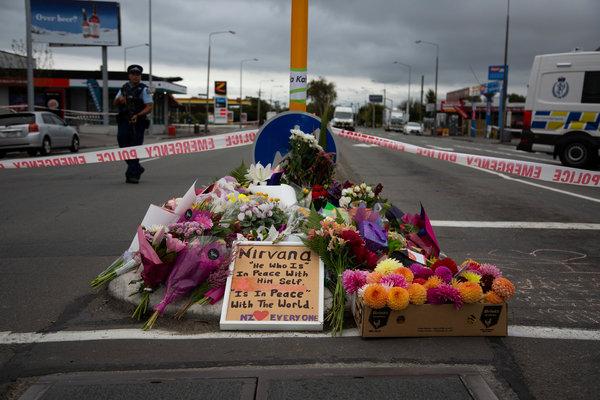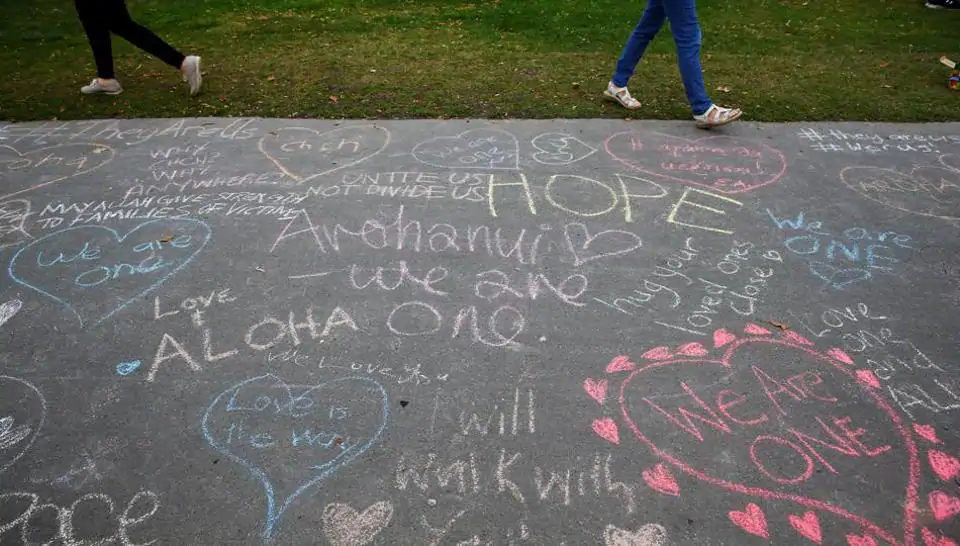Even the name where the evil was methodically planned and executed was carefully chosen. Christchurch. The usual narratives for the New Zealand massacre are woefully inadequate: Islamophobia; immigration scapegoating; the toxic Net; and Trump and his ilk’s “invader” mentality. It’s now about the evil in human consciousness as a whole.
An excreta of evil erupted from a conduit of collective darkness who calmly murdered Muslim immigrants and refugees from Syria, Jordan, Pakistan and Bangladesh, people who had fled places with some of the worst suffering in the world, happy to have found a new life in what they believed was a welcoming land.
As The Hindu reported, “New Zealand is a nation so placid and so isolated from the mass shootings that plague the U.S. that police officers rarely carry guns.” But the evil in human consciousness wanted everyone in the world to know that “no place on earth was safe.”

The livestreamed slaughter of Muslims at two mosques in Christchurch was staged as a real-time, real-life horror show. “Let get this party started,” spewed the hate-filled face of the 28-year-old Australian national as he drove to Al Noor Mosque, in what newspapers described as “a historic, English-flavored city on New Zealand’s South Island.”
Commentators referred to “the same ideological network” of white nationalism, anti-immigrant, anti-Muslim themes and memes. At one level, that’s a necessary analysis to understand the worldwide rise of fascistic mentality, politics and so-called leaders. But it is not sufficient to even begin to understand and dispel evil behind such acts, and confront the global conflagration of hate in human consciousness.
Australian Senator Fraser Anning, echoing Donald Trump and his cultish, anti-immigration, blame- the-victims followers, said, “The real cause of bloodshed on New Zealand streets today is the immigration program which allowed Muslim fanatics to migrate to New Zealand in the first place.”
Substitute America for New Zealand, and ‘Mexican rapists and Central American gangs’ for “Muslim fanatics,” and Donald Trump could have said the same thing. Hell, he has said the same thing.
So what is the root of evil? Identifying oneself first as Christian or Muslim, American or Russian, rather than emotionally perceiving oneself first and last as a human being, one contributes to division, hatred and slaughter. These are the roots of the Christchurch massacre, and the ISIS massacres, as well as the invasion of Iraq.
I don’t like thinking and writing about evil, but it has become so prevalent in this culture, and in human consciousness generally, that I feel a responsibility to do so. Especially since I’ve apparently had new insights into the phenomenon of premeditated malevolence.
To my knowledge, there has never been an adequate philosophy of evil, neither in Western or Eastern philosophy. Theological explanations no longer hold water, and have rightly become suspected sources of darkness themselves. But psychologizing, much less politicizing evil doesn’t cut it either.
What is evil, where does it come from, and how do ordinary human beings confront and dispel it?
Evil is a man-made phenomenon, an inevitable by-product of ‘higher thought’ without self-knowing. Though evil is comprised of individual division, neglect and hate accumulated over the generations, it is inherently a collective phenomenon, even when it exists within an individual that acts out of it.
The collective nature and intentionality of evil is what intellectuals and New Agers have the hardest time acknowledging. It’s psychologically comforting for them to simplistically believe that “evil is thoughtless, that it is a refusal to reckon with the nature or consequences of one’s actions.”

It’s utterly shallow to believe “there is so much less to evil than it seems.” Such tripe leads supposedly serious commentators to say silly things like, “evil is the simple adherence to orders in the course of a genocide.”
It’s also a risible understatement to opine, “For all the focus on self-hood, we aren’t particularly self-reflective.” In fact, the more the focus on self, the less self-reflective a person is. That’s how American culture has become saturated with darkness, and dead to the point of pandemically depressed.
But it’s also false to say, in the dying Catholic and Christian tradition: “We don’t have any idea how evil we really are; considering it is too hard.” It reflects the old Manichean, ‘original sin’ view, which for centuries inculcated people with the idea that there is a cosmic battle between good and evil, and that we’re born bad.
A distinction has to be made between darkness and evil. Even though the words are used synonymously, there is an important difference. All of us have darkness within us—jealousy, grudges, antipathies, selfishness, etc. But evil only exists where there is the intentional desire to do harm and justify it, and call it good.
Evil is not simply individual and collective acts of torture, murder, slaughter and war. Evil is the combined and growing content of darkness in individual and collective consciousness, plus intentionality, which manifests through individuals and entire peoples.
This cretin slaughtering Muslims in New Zealand was not acting alone, though he committed the atrocities by himself. He livestreamed his heinous acts directly into human consciousness on the promptings of evil beyond just himself. It was an assault not only on Muslims, but on the human psyche and soul.
Martin LeFevre
Lefevremartin77 at gmail.com
Fountainoflight.net

